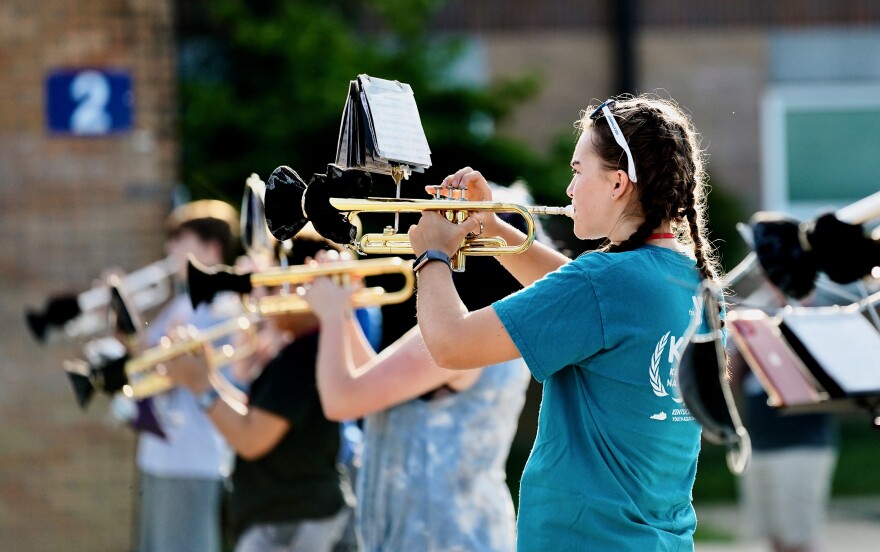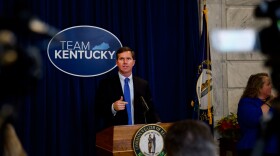89.3 WFPL News Louisville · Kentucky Music Educators Try To Make In-Person Rehearsal Work, Even In A Pandemic
Members of the Oldham County High School (OCHS) marching band were spread across the school parking lot one hot August afternoon, using the painted parking space lines to make sure they stayed six feet apart. Oldham County schools are operating virtually for now. But after-school extracurricular activities like sports and marching band can still take place in person under certain guidelines.
Masks dangled from music stands while students played through their warm-up. The bells of all the brass instruments were covered in black fabric to keep potential COVID-19-carrying water droplets from floating across the parking lot along with their B-flat arpeggios.
"When you play through the instrument, the spit goes all the way through the instrument and it kind of projects out," sophomore trombonist Matthew Lewis explained. "This kind of keeps the particles from going out. So if you have COVID, then it prevents it from getting to other people."
Marching band members are used to playing outside in strict formations. But the bell covers and the masks are new. Research shows that singing and playing band instruments could increase spread of the coronavirus. Outdoor rehearsal, bell covers, social distancing and masking are all ways Kentucky music educators are trying to adapt to the unique challenges they face during the pandemic.
Brad Rogers has been band director at OCHS for 33 years of his four decades in music education. He said relying only on virtual instruction would be "a death sentence for a band." He worries that without in-person rehearsals, enrollment in band, and maybe music in general would plummet.
"There's nothing that will substitute for the entire group being together. There's no replacement for that," he said.
So he's come up with some creative research-based ways to try to mitigate the risk of spreading the virus. He found that shoe covers normally used in construction or hospitals fit perfectly over the bells of most brass instruments. For the tubas, he had covers custom-made by a company that usually makes uniforms for the color guard. The group mostly practices outside, but if they go indoors they stand on decals Rogers has stuck to the tile floor that provide a six-foot radius for each musician.
Also, there's hand sanitizer — lots of it.
“I never figured that I would be a person who would have to buy gallons of hand sanitizer," he joked.
Rogers is following recommendations from the Kentucky Music Educators Association (KMEA), and a study out of the University of Maryland and University of Colorado Boulder. Researchers tested how far instruments spread COVID-carrying water droplets, and how long those droplets linger in the air.
Jelena Srebric leads that work as professor of mechanical engineering at the University of Maryland. Srebric has been studying ventilation and air quality for 25 years. Once scientists discovered how the virus moves through the air, Srebric realized how much her research could help, especially when it comes to playing music in schools buildings, which tend to be old and have poor ventilation.
"We are now facing a problem with infrastructure that was never designed to deal with COVID. And we are basically asking my Prius to run a Formula One race," she said.
Without proper ventilation, aerosol particles carrying COVID-19 distributed by breathing, talking, singing or playing an instrument can build and linger, increasing the risk of infection. For that reason Srebric recommends musicians practice outdoors if possible. If rehearsals must take place indoors, Srebric suggests practicing for only 30 minutes at a time, and leaving the room for another 30 minutes to allow the air to exchange before returning.
She's even suggested that groups could build their own low-cost air cleaners with little more than a large fan and an air filter.
Below is video from the study that shows the "plume" of aerosolized particles created when playing the clarinet under different scenarios, including inside a bag.
https://www.youtube.com/watch?v=r0-aZ-PQ_hI&feature=youtu.be
Srebric and colleagues' series of experiments showed that covering instruments with certain kinds of fabric, especially pantyhose, can significantly reduce the distribution of COVID-carrying particles. This is hardest for vocalists, because masks impact the sound and color of the voice. But Srebric said some singers have found that masks with a bill-like structure do the trick.
"What we are trying to do is now assess how long things stay in the air, how far they travel, and how much can we disrupt, to give you more time in the space that is kind of a safe environment," she said.
Even with these safety protocols some music teachers aren’t comfortable with in-person classes.
Maggie Owens resigned from her post as choir director at OCHS earlier this summer. At the time, Oldham County was still planning to go back in-person at the start of the academic year.
"It was really heavy on my heart thinking 'Am I gonna have to quarantine from my own kids?'" she said, noting that her youngest, a six-month-old, is still breastfeeding. "That's not a possibility."
When she wasn’t able to teach virtually, Owens said she had to make a tough decision.
“While I wanted to fight for my students, and fight for the choral art, and be there for them, I just also thought I've really got to prioritize the health and safety of my family," she said.
Owens said she believed she could have made a virtual curriculum work.
“If I had gone back to the classroom, it would have been a primarily music theory curriculum, like dictation oral skills, things that involve maybe solo singing, but not singing together as a community," she said.
OCHS principal Andy Moore said he believes "there's a large benefit" to continuing to offer performing arts programs in-person, with new safety protocols in effect. But it's up to staff and students whether they participate.
"Individuals are having to kind of do that gut-check, and what is the risk-reward? What is my home life? Can I afford to take this kind of individual risk within my family?" he said.
Moore said Owens is not the only teacher who resigned from OCHS rather than teach in-person, but that the overall number is "incredibly low."
Rogers said some students have decided not to participate in in-person practices this year, but he thinks it's important to carry on for the students who do want to. Band, he said, is about more than music, it's also about socialization and learning to work together.
"It's all that stuff that actually helps you become a better person, as an adult," he said. "The music's the glue, you know, and when it comes right down to it, the the only way that you can really do this is in person."
Rogers said he’s not trying to skirt the rules. He wants band to be safe. But he said he’ll do whatever it takes to allow kids to play music in person, together.










